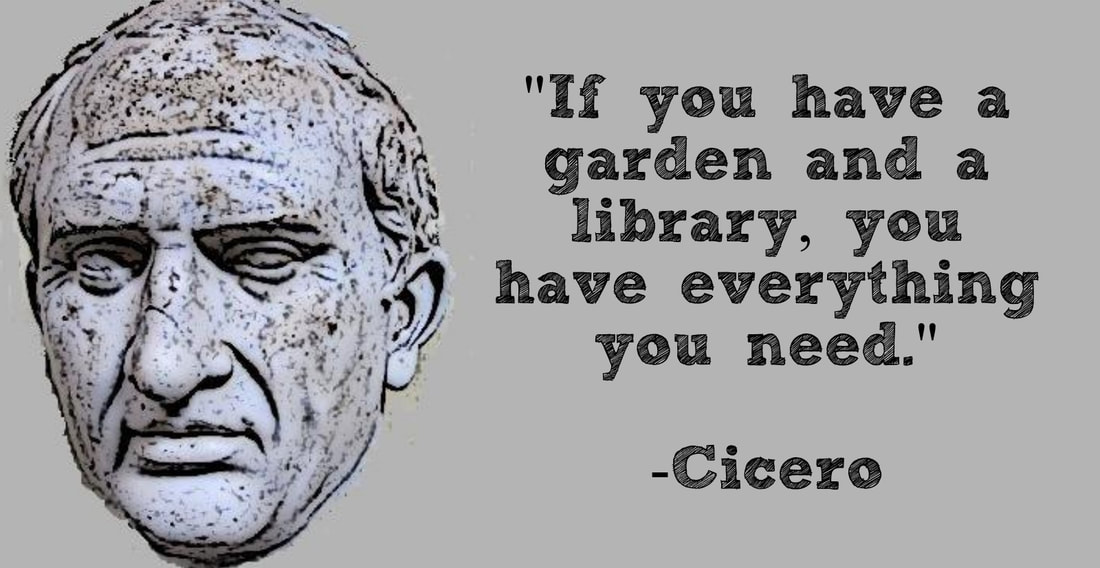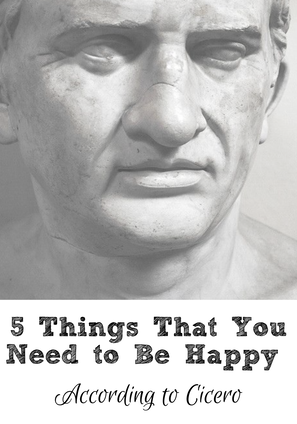In a letter Cicero wrote while trying to arrange a visit with his new friend, fellow scholar Marcus Terentius Varro, he states: "If you have a garden in your library, we will want for nothing."[1]
Cicero and Varro were rich. Both owned various estates across Italy. He could have asked for, and expected, all of the luxuries common to his class - silk sheets, scented oils, the finest food and wine. Why did Cicero place such high importance on the garden and the library then? What is truly necessary for us to flourish in life?
1. A Garden
"In the middle of Roman buildings...a roofless square, often with Greek sculptures and temples was where the hortus, the garden, was planted and enjoyed. Common Romans might only have had a small courtyard, or paved square with pots. Many grew basic foods, as a thin bulwark against starvation. The rich enjoyed much larger, more fertile and refined gardens, often closer to parks than yards...Cicero's correspondent, Varro, was not only well-off, but also a scholar of gardening and farming. In light of this, it's likely that Varro did offer Cicero a well-stocked library, and in it a luxurious garden."[2]
Cicero enjoyed the calm and serenity of the garden as he got older. In On Old Age, he writes about the garden as a place to watch vegetables grow, enjoy the warm sun or a good a fire in winter, the shade of trees and a pleasant swim in the summer. "By means of our hands we struggle to create a second world within the world of nature," he wrote. As someone at least partially influenced by Stoicism, Cicero also experienced nature as rational. The garden was a microcosm of the larger order of the cosmos.[3]
2. Books
[The statement] "'If you have a garden in your library,' might read strangely to modern eyes, used to sterile, air-conditioned libraries, with strict humidity controls and rules about whispering. But in Republican Rome, libraries were ordinary buildings, rarely specialised or purpose-built. A bibliotheca may simply have been plain stone and wood rooms, in one wing of a building, stacked with papyrus rolls or even wax tablets."[4]
Cicero loved books and libraries so much that stated "A room without books is like a body without a soul." He took refuge in his books during times of personal upheaval (see number 5 below), which is likely why he considered reading so essential for happiness.
3. Peace
For many in the Classical world, a state of latent hostility was presumed to be the prevailing human condition. Cicero did not share this belief. His views on peace and war are based on his conviction that peace is the norm of civil and international relationship.[5] In De Officiis, he states:
"Now since there are two ways of contesting for a decision, one by discussion, the other by force, and since the former is proper for man, the latter for beasts, one should have recourse to the latter only if it is impossible to use the former."
Cicero was certainly no coward, since he paid for his loyalty to the Republic and opposition to Caesar with his life. But he was a staunch supporter of conversation and diplomacy, rather than recourse to violence, as the only rational way for humans to solve their problems.
4. Tranquility of Mind
Ataraxia is a Greek term defined as “without trouble.” It is sometimes translated as “tranquillity.” Basically, it's a state of mind consistent with eudaimonia, or a good flow of life. Cicero felt that happiness was not the result of experiencing pleasure as the Epicureans argued, but of ataraxia. Having a peaceful and tranquil state of mind means that you are undisurbed by irrational emotions like anger, strong desire, and so forth.
Cicero struggled with acheiving tranquility of himself. He was said to have an irritable temperment. In later years, he was torn between the need for political action and the calm pleasures of literature and philosophy. It is hard to be tranquil when dealing with strong competing desires.
As a naturally passionate person, I can empathize. We often fall short of our philosophical ideals, but that is no reason to stop making progress.
5. Philosophy
When things weren't going well for Cicero personally, he flung himself into the world of ideas as a way to survive his troubles. During his exile in Greece, and his later banishment from the Senate by Caesar, philosophy became a way for Cicero to give back to the larger community when he could no longer take what he felt was his natural place in politics. "Being driven from my dominion in the forum,' he wrote to Varro,' I have erected a sort of Academy in my own house." (The first Academy was established by Plato in Athens).
It is fortunate for us that Cicero found philosophy a worthy pursuit; his extensive writings have remained one of the more complete sources on ancient philosophy, used continuously for over 2,000 years.
Sources:
1. http://www.abc.net.au/news/2012-12-21/young-the-garden/4437806
2. ibid.
3. ibid
4. ibid
5. https://archive.org/stream/jstor-3288190/3288190_djvu.txt
~
You May Also Like:
Solomon Kane: Must See Fantasy Flick About the Paradox of Nonviolence
5 Signs You Lack Maturity According to Cicero
Why You Should Create Your Own Culture to Be Happier











